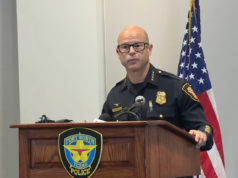County officials jumped to action after Cindy Sheehan camped out near the ranch this summer and demanded to speak to the prez about her soldier son’s death in Iraq. The protest grew from a handful of people to hundreds and attracted nationwide media attention. Sheehan planned to try again during the Thanksgiving holidays, but in the interim, McLennan County officials passed ordinances limiting the use of public roads within seven miles of the ranch.
Several war protesters put their names on a lawsuit this month contending that the ordinances illegally restrict free speech. The case was filed by Texas Civil Rights Project director Jim Harrington, who characterized the ordinances as “un-American, un-democratic, and unconstitutional.” He might be onto something. Similar protests at the real White House prompted White House spokesman Scott McClellan to reaffirm “the right of the American people to peacefully express their views.” Those rights apparently get bush-hogged in rural McLennan County.
What They Mean by “No”
Ken Parish Perkins, media critic and one of the better writers at the Fort Worth Star-Telegram for a decade, has packed his writing tools and slipped away after being accused by his bosses of indulging in journalism’s cardinal sin of plagiarism.
It’s true that lifting from another’s work is a big no-no and that the S-T has a stringent policy against it. No exceptions, said David House, the paper’s public advocate – the reader’s trust is the S-T’s most important asset.
No exceptions? Well, okay, maybe – if the words being stolen are from this rag.
In 2000, after Fort Worth Weekly’s Betty Brink first reported on horrendous medical conditions at the Carswell Federal Medical Center for women, she was startled to see many of those words reappear verbatim in a column by most-beloved or most-hated (depending on one’s politics) columnist Molly Ivins. After an initial denial, Ivins apologized and admitted to the Weekly that she had read its story but swore she had properly attributed the quotes, only to have the attribution deleted by an S-T editor, Paul Harral.
Harral called her, Ivins said, “specifically to ask how much of the material came from Betty’s article.” Ivins told him, “I had indeed used Betty’s written version as a backup.” Harral’s response? He’d dropped the attribution as a “straight edit for space.”
Gee, Ken, maybe you just didn’t use the right words in explaining your ethical lapse. Or maybe your editor just took all that nonsensical attribution stuff out “for space.”











